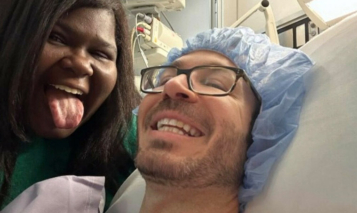
ESPN host Stephen A. Smith credits the Covid-19 mRNA vaccine with saving his life after he was diagnosed with double pneumonia on New Year’s Day.
The 54-year-old sports analyst is triple vaccinated, but his vaccine status didn’t prevent him from becoming severely ill and hospitalized.

Smith returned to the set of ESPN’s “First Take” on Monday, where he told viewers his doctors said he would have died without the vaccine.
Smith says he thought he was dying after he was hospitalized with a 103-degree fever and double pneumonia on January 1. “It almost took me out.”
He described waking up at night soaked in sweat and “coughing profusely.”
“I didn’t know if I was going to make it. They told me, had I not been vaccinated, I wouldn’t be here. That’s how bad I was.
“The vaccine, according to [my doctors] saved me,” he said.

Smith noted that “everybody’s different,” and he mentioned his sister, who is a smoker, had recovered from COVID in a few days.
“You’re assuming that you’ll have a fever, might have a cough, gonna have that massive headache — but you’ll get over it,” he said. “In a lot of cases that was the case. In my case it was totally different.”
As Smith spoke, he coughed and cleared his throat often. He assured his viewers that he’d tested negative for COVID.
Smith urged viewers to get vaccinated and wear N95 or KN95 masks.
“I think the one thing to emphasize the importance of, no matter how you feel about the vaccine, that mask is important,” he said.
“The reason why the mask is so important is you don’t know how the next person is affected. How I’m affected is different from you are affected.”

Smith shared a photo of him receiving his first vaccine dose in March 2021 and urged his fans to “think about your fellow man and woman, not just yourself, when it comes to this.”
Covid-19 is a novel coronavirus that causes flu-like symptoms. People at risk of death include the elderly, immunocompromised, morbidly obese, those with pre-existing conditions, and smokers (cigarettes or marijuana).





